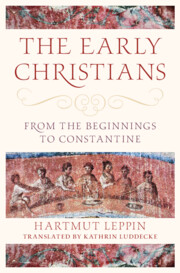Book contents
- The Early Christians
- Classical Scholarship in Translation
- The Early Christians
- Copyright page
- Contents
- Figures
- Foreword
- Acknowledgements
- Abbreviations
- Introduction
- Prologue: A Dead Body Is Lost to the World
- Chapter 1 Neither Jewish nor Pagan?
- Chapter 2 Christian Authorities
- Chapter 3 (Not) of This World
- Chapter 4 Citizens of Two Worlds
- Looking Back and Ahead
- Postscript
- Translations of Primary Sources
- Notes
- Bibliography
- Index of persons and places
Looking Back and Ahead
Published online by Cambridge University Press: 05 October 2023
- The Early Christians
- Classical Scholarship in Translation
- The Early Christians
- Copyright page
- Contents
- Figures
- Foreword
- Acknowledgements
- Abbreviations
- Introduction
- Prologue: A Dead Body Is Lost to the World
- Chapter 1 Neither Jewish nor Pagan?
- Chapter 2 Christian Authorities
- Chapter 3 (Not) of This World
- Chapter 4 Citizens of Two Worlds
- Looking Back and Ahead
- Postscript
- Translations of Primary Sources
- Notes
- Bibliography
- Index of persons and places
Summary
It is striking that Christians were so successful. They had internal dissension; lacked relics; had no common temple; came from less educated classes and the periphery of the empire; Jews and pagans harassed, even persecuted them. Because they did not offer sacrifices, excluding them from offices and festivals, and were unable to maintain certain family traditions they appeared antisocial. Yet Christ-followers succeeded in winning over non-Jews as well. The persecutions welded Christians together, and martyrs served as role models, even to those who had manifested weakness. In areas such as sexual morality, Christians sought to demonstrate that they were superior to contemporaries of other faiths. They also formed transregional networks. The opportunity to gain prestige in Christian communities also attracted people. Various forms of authority competed with each other, especially the charismatic and spiritual authority of those who excelled in ascetic practices. That in the end monarchical bishops were to become the decisive figures in Christianity was by no means clear from the beginning. That Roman emperors would support Christianity was an unlikely development that changed Christianity significantly. But the tradition of a defiant piety that defined the beginnings was not lost, so that Christianity continued to renew itself.
Keywords
- Type
- Chapter
- Information
- The Early ChristiansFrom the Beginnings to Constantine, pp. 368 - 393Publisher: Cambridge University PressPrint publication year: 2023



